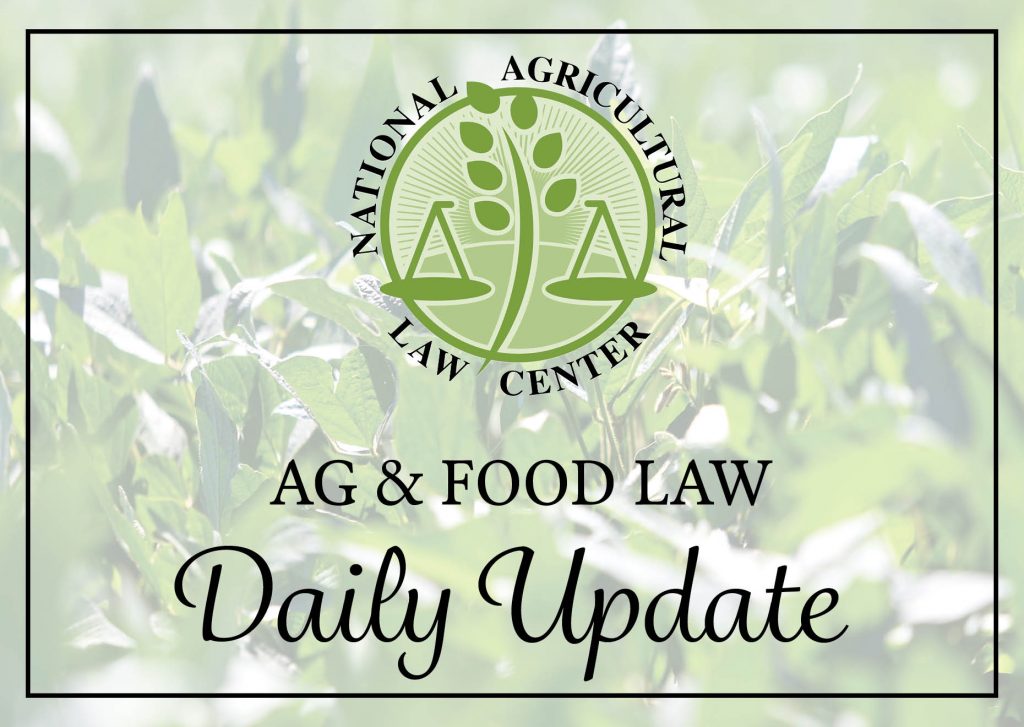A comprehensive summary of today’s judicial, legislative, and regulatory developments in agriculture and food. Email important additions HERE.
JUDICIAL: Includes FIFRA
In Rural & Migrant Ministry v. U.S. Envtl. Prot. Agency, No. 20-CV-10645 (LJL), 2020 WL 7706782 (S.D. N.Y. Dec. 29, 2020) the plaintiffs requested a temporary restraining order (“TRO”) and a preliminary injunction preventing an Environmental Protection Agency (“EPA”) regulation from going into legal effect. The court granted the TRO, preventing the regulation from going into effect until January 12, 2021, pending a hearing on the preliminary injunction. The disputed regulation would affect the Federal Insecticide, Fungicide & Rodenticide Act (“FIFRA”) which regulates the labeling and use of pesticides in the United States. One of the functions of FIFRA is to protect agricultural workers and pesticide handlers from harm as the result of pesticide exposure. FIFRA accomplishes this through a comprehensive collection of pesticide management practices that apply to agricultural pesticide use in crop production. In 2015, EPA passed a new regulation intended to further strengthen FIFRA’s protections for agricultural workers. Under that rule, the area around pesticide application equipment was referred to as the “application exclusion zone” (“AEZ”). The AEZ was a 100-foot horizonal circle surrounding the application equipment that moves with the application equipment. Pesticide handlers were required to immediately stop applying pesticides if any other person besides an appropriately trained and equipped handler entered the AEZ. In 2020, EPA issued another regulation rolling back several from of the protections found in the 2015 regulation, including the AEZ provisions.
This litigation challenges the 2020 regulation, arguing that it violates FIFRA and should be fully repealed. Initially, the 2020 regulation was set to take effect at the end of December, 2020. However, the plaintiffs in this case asked the court to issue a TRO while the case is being litigated. In order to obtain a TRO, the plaintiffs must establish that: (1) they are likely to succeed on the merits; (2) they are likely to suffer irreparable harm in the absence of a TRO; (3) the balance of equities tips in the plaintiffs’ favor; and (4) an injunction would be in the public interest. Here, the court concluded that the plaintiffs were likely to succeed on the merits of their case because the justifications EPA relies on for the 2020 regulation do not satisfy the requirement that EPA “examine the relevant data and articulate a satisfactory explanation for its action including a rational connection between the facts found and the choice made.” Because the court concluded that a TRO was necessary, the 2020 regulation will not take effect until January 12, 2021 while the court considers whether a longer injunction of the regulation is necessary.
REGULATORY: Includes FWS
FISH AND WILDLIFE SERVICE
Final rule reclassifying the June sucker from endangered to threatened under the Endangered Species Act, due to substantial improvements in the species’ overall status since its original listing as endangered in 1986. Info here.
